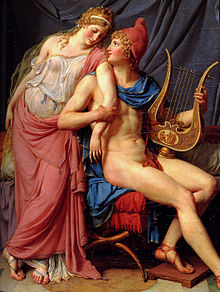
| Part of a series on |
| Sappho |
|---|
 |
| Poetry |
|
Fragments:
Papyri:
|
| Related |
|
|
Sappho 16 is a fragment of a poem by the archaic Greek lyric poet Sappho.[a] It is from Book I of the Alexandrian edition of Sappho's poetry, and is known from a second-century papyrus discovered at Oxyrhynchus in Egypt at the beginning of the twentieth century. Sappho 16 is a love poem – the genre for which Sappho was best known – which praises the beauty of the narrator's beloved, Anactoria, and expresses the speaker's desire for her now that she is absent. It makes the case that the most beautiful thing in the world is whatever one desires, using Helen of Troy's elopement with Paris as a mythological exemplum to support this argument. The poem is at least 20 lines long, though it is uncertain whether the poem ends at line 20 or continues for another stanza.
Cite error: There are <ref group=lower-alpha> tags or {{efn}} templates on this page, but the references will not show without a {{reflist|group=lower-alpha}} template or {{notelist}} template (see the help page).